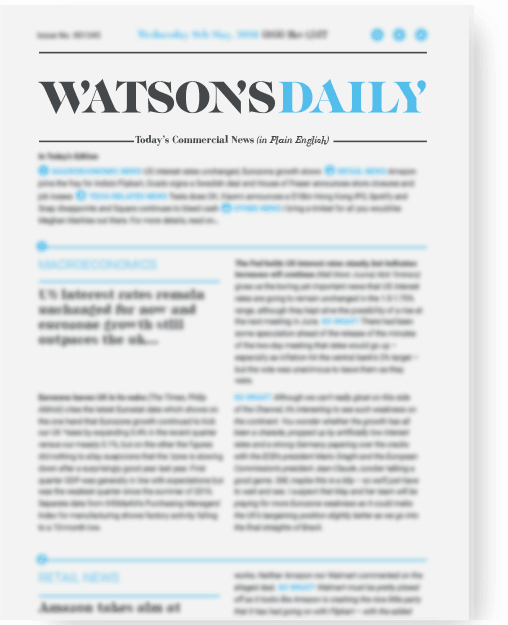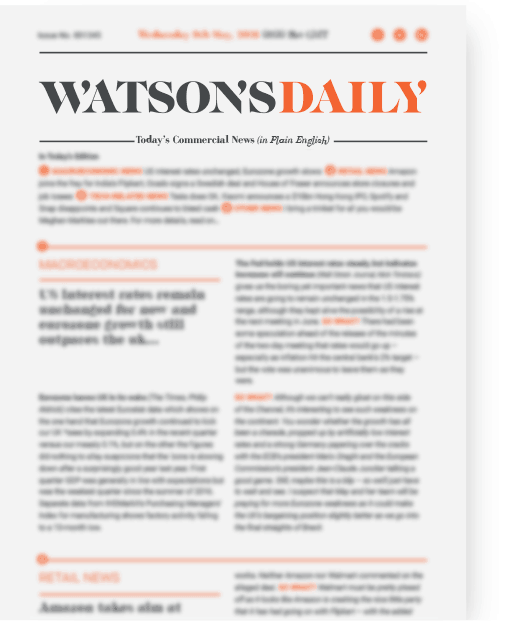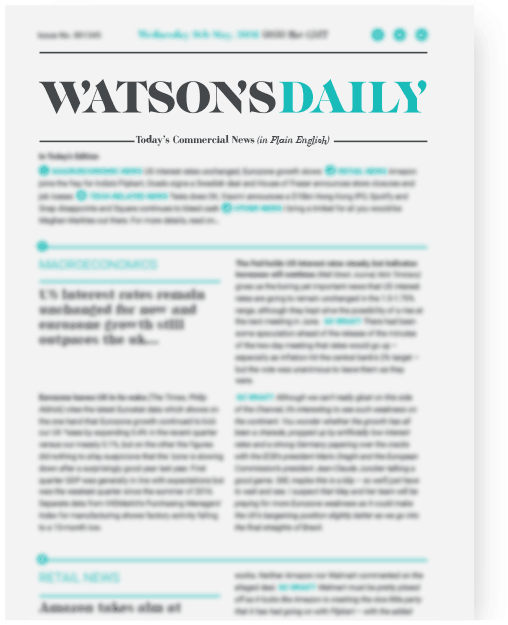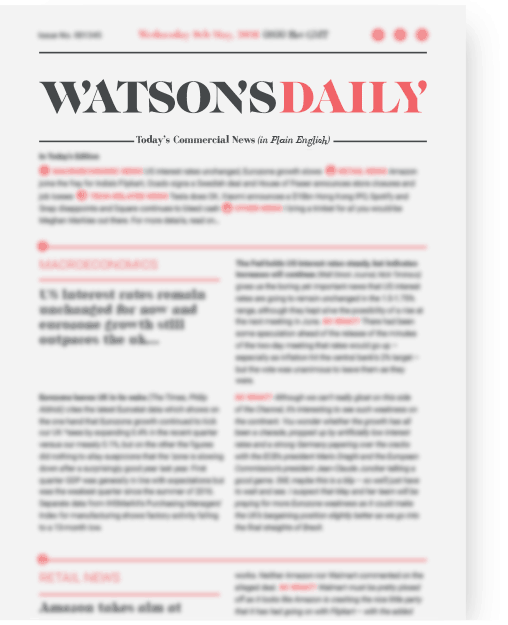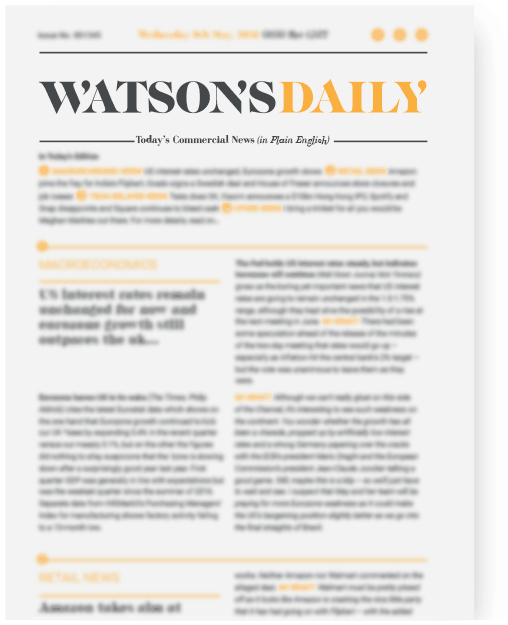- In NEWS ON US TRENDS TODAY, profits gain for big US companies
- In CHINA TRENDS, millennials’ love of credit cards stokes debt fears and drug companies transition from copycat supremos to impressive originals
- In UK TRENDS, accountants look like they’ll get more of a level playing field and the labour market remains tight. In INDIVIDUAL COMPANY NEWS, House of Fraser limps on
- In INDIVIDUAL COMPANY NEWS, House of Fraser limps on
- In OTHER NEWS, I bring you a domino topple fail…
1
US TRENDS
So corporate America sees booming profits…
Profits surge at big US firms (Wall Street Journal, Thomas Gryta) highlights the impressive performance of S&P 500 companies which have jumped up by around 23.5% in the three months through June, according to data from Thomson Reuters. This leap has straddled all sectors
with solid consumer and business spending along with rising commodity prices and fears of potential tariffs pushing companies to put up their prices. The slashing of the US corporate tax rate from 35% to 21% is also a big driver of profit gains – but the longevity of such a one-off boost will depend largely on how companies use the windfall. * SO WHAT? * It’s all good so far for the Americans. Although input costs are rising, there is enough confidence knocking around in the economy to raise end prices to customers, so there’s no need to panic too much. Couple that with unemployment at historic lows and rising wages and you’ve got enough slack to play with at least in the short term to weather any tariff shenanigans IMHO.
2
CHINA TRENDS
In news on China trends, debt concerns continue over millennials’ love of credit cards and pharma companies move from being notorious copycats to pioneers…
China millennials’ love of credit cards raise debt fears (Financial Times, Tom Hancock and Wang Xueqiao) takes a look at consumer debt in China as it seems that young people are increasingly reliant on credit cards to fund their lifestyle. According to figures from Chinese investment bank CICC, outstanding consumer loans used for things like vehicle purchases, holidays and household renovations etc., shot up by almost 40% last year and, along with massive growth in mortgage lending, consumer loans have helped to push household borrowing up to 40% of GDP by the end of 2017 – over twice the percentage it was at in 2011. * SO WHAT? * On the one hand, the Chinese government has been trying to crack down on burgeoning debt, but then again it has also been trying to shift the engine of economic growth to consumption. A study of 54 economies by the Bank if International Settlements found that household debt can be problematic when it exceeds the 60% of GDP threshold, but at 40% is it more than developing countries but still short of 60% in the EU and 80% in the US. Consumer loan growth has also been boosted by the mushrooming of online peer-to-peer lenders who collect money from retail investors and dole out small loans to consumers without collateral, with
interest rates of up to 37%. There is a feeling amongst some that there is a ticking timebomb here as China doesn’t have much in the way of credit history on consumers – the average US consumers’ credit history goes back 14 years whereas your average Chinese consumers’ credit history only goes back a few months – making good lending decisions much harder and the proportion of non-performing loans consequently higher. If this situation continues unchecked, it could scupper growth in the future as households are forced to spend a higher proportion of disposable income on servicing debt, thus curtailing spending elsewhere. It’s not a disaster at the moment, but no doubt the authorities will be monitoring this situation.
How China is evolving from a maker of copycat medicines into a producer of complex drugs (Wall Street Journal, Preetika Rana) is a really interesting article that heralds a transition for Chinese pharmaceutical companies from blatant copycats to drug pioneers as it takes the example of start-up Nanjing Legend Biotechnology Co which received $350m at the beginning of this year from Johnson & Johnson for the global rights to co-develop and market an experimental treatment for blood cancer. In May, the US Food and Drug Administration (FDA) approved testing for Americans – the first time a Chinese-developed gene therapy has got the go-ahead – with trials scheduled to start later this month. This is just one example of how China is making big efforts to move away from its reputation of making cheap copycat medicines to complex ones. * SO WHAT? * Beijing has made scientific innovation a top national priority and has been targeting things like genetics-based therapies such as Legend’s CAR-T. It is a new field but it just goes to show what can be achieved by government backing. Big Pharma had better watch out as China is the new player in town!
3
UK TRENDS
In news on UK trends, accountants foresee a more level playing field and the labour market continues to be super-tight…
In Accounting rivals look forward to a more level playing field (The Times, Tabby Kinder) we see that recent scandals are putting increasing pressure on accountancy’s Big Four – PWC, KPMG, Deloitte and EY – to get their act together as politicians, investors and regulators are all calling for more competition in auditing. * SO WHAT? * The fifth and sixth biggest accountancy firms, Grant Thornton
and BDO, have often complained of being shut out by their larger rivals – BDO only audits one FTSE100 client and Grant Thornton said it would no longer bother pitching to large listed companies after consistently coming second to the Big Four. However, it seems that the top nine audit firms have got together ahead of a potential enquiry by the competition regulator to divvy up the auditing more equally, which could result in Grant Thornton and BDO taking on 20 to 30 FTSE250 audits. Given that Grant Thornton and BDO’s audits were deemed to be of higher quality than those of the Big Four by the audit watchdog, it would seem that previous arguments of the Big Four having better skills, tech and resources are baseless. As one institutional investor put it, “By bringing in smaller firms, you are increasing their skillset and improving overall choice. It is the only way to ensure better quality of audits. As we’ve seen, having a Big Four auditor is no guarantee that investors are getting a true picture of a company’s accounts”.
4
INDIVIDUAL COMPANY NEWS
In individual company news, House of Fraser limps on…
House of Fraser left reeling as Ashley ‘cools’ on rescue plan for store chain (The Guardian, Zoe Wood and Miles
Brignall) tells us two things: that landlords who were due to contest House of Fraser’s Company Voluntary Arrangement (CVA) this week have dropped their legal challenge leaving the company free to close 31 of its 59 stores. The other thing was that Sports Direct’s Mike Ashley’s interest is cooling on doing a deal with the embattled department store. * SO WHAT? * Getting the CVA will certainly make the company more attractive to potential suitors. However, caveat emptor – as the saying goes, you can’t polish a t*rd, but you can roll it in glitter ;0)
5
OTHER NEWS
… And finally, in other news…
If you are feeling the post-weekend blues, just think that things could always be worse. Sympathy goes out to all those involved setting up dominos with tweezers for two weeks in Fly single-handedly ruined domino world record attempt (Metro, Martine Berg Olsen https://tinyurl.com/y9dkarbh). Noooooooo!
As always, thank you for reading Watson’s Daily!





